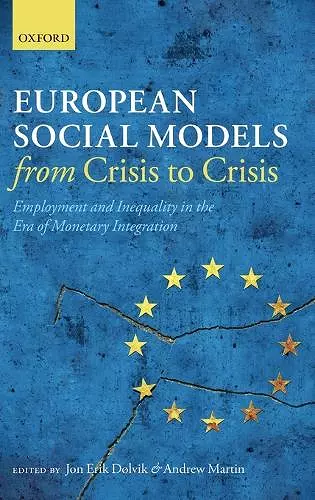European Social Models From Crisis to Crisis:
Employment and Inequality in the Era of Monetary Integration
Andrew Martin editor Jon Erik Dølvik editor
Format:Hardback
Publisher:Oxford University Press
Published:18th Dec '14
Currently unavailable, and unfortunately no date known when it will be back
This hardback is available in another edition too:
- Paperback£31.49(9780198798866)

This book analyzes the interaction of European social models - the institutions structuring labor markets' supply side - and their turbulent macroeconomic environment from the deep Europe-wide recession, ending Germany's post-unification boom, through monetary union's establishment, to the Great Recession following the recent financial crisis. The analysis reaches two conclusions challenging the dominant view that the social models caused unemployment by impairing labor markets' efficiency in the name of equity. First, the social models' employment and distributive effects are far outweighed by their macroeconomic environment, especially in the Eurozone, where its truncated structure of economic governance transformed the Great Recession into a sovereign debt crisis. Second, instead of a trade-off between efficiency and equity, the employment effects of counteracting markets' tendency to generate inequality depends on the macroeconomic conditions under which it occurs and how it is done.
the editors and their team of experts have provided a detailed and critical compendium of European welfare state evolution over the last two decades. The reader can use it either to gain a comprehensive understanding of trends and issues, or as a point of reference for individual nations. * Tony Gore, JMCS *
This book can be recommended to scholars and students of different disciplines, from political sciences and law to all strands of economic and social research. It is an indispensable and timely tool for all EU and domestic policy makers interested in shaping the future direction of the evolution of the European social models. The book could be also very useful for all those who are eager to understand the social dimension of the euro crisis. * Effrosyni Bakirtzi, European Journal of Social Security *
[T]his is an impressive volume that intelligently raises and answers a multitude of questions, and which has yet to find robust competition. The book is a must for the library of every political economist, comparative social policy scholar, and historically attuned economist. * Robert Hancke, Council for European Studies Reviews *
This is a fascinating book providing a wealth of information and incisive analysis on how monetary integration affects the evolution of social models in Europe. It is required reading for all those who are eager to understand the social dimension of the euro crisis. * Paul De Grauwe, John Paulson Professor in European Political Economy at the London School of Economics and Political Science *
European Social Models from Crisis to Crisis is an amazing volume with sobering conclusions for European welfare state and integration prospects. It is the first collection in welfare regime studies and comparative political economy to show how the European sovereign debt crisis, with its aftershocks of mass unemployment and rising inequality resulted from how monetary integration unfolded since the 1989 fall of the Berlin Wall. By doing so in a highly structured fashion, the volume rightly breaks with the convention of 'methodological nationalism.' It's a first rate, timely and utterly indispensable read for EU and domestic policy makers, welfare state students, political economists and EU integration pundits and academics. * Anton Hemerijck, Professor of Institutional Policy Analysis, VU University Amsterdam, and Centennial Professor of Social Policy, LSE *
This volume delivers a pioneering study of the connection between the development of Europe's monetary system and the evolution of European welfare and labour regimes. Analysing the causes and consequences of the recent crisis, Dølvik and Martin conclude that the divergence within the Eurozone is likely to deepen. Clearly, ignoring the crisis' severe social consequences implies risking disintegration of EMU and destabilisation of the EU. To better reconcile Europe's economic and social objectives, EMU needs further reform. Reading this book will help all who want to work on this in either theory or practice. * László Andor, Commissioner for Employment, Social Affairs and Inclusion, European Commission 2010-2014 *
impressive volume * Caroline de la Porte, Transfer *
ISBN: 9780198717966
Dimensions: 236mm x 162mm x 31mm
Weight: 840g
460 pages